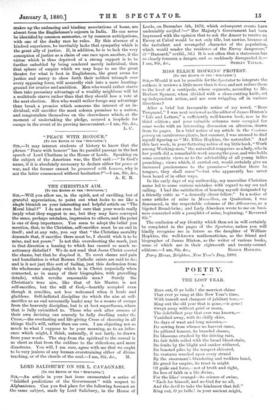'11:LE CHRISTIAN AIM.
ero THE EDITOR OF THE "SPECTATOR.'] SIR,—Will you allow me, in the spirit, not of cavilling, but of -grateful appreciation, to point out what looks to me like a single blemish on your interesting and helpful article on "The Moral Ideal ?" I do not even feel sure that your words really imply -what they suggest to me, but they may have conveyed the same, perhaps mistaken, impression to others, and the point is one of deep importance. You seem to adopt the belief you
mention, that, to the Christian, self-sacrifice must be an end in itself; and at any rate, you say that "the Christian morality demands that, if sacrifice there must be, I should wish it to be mine, and not yours." Is not this overshooting the mark, just
in that direction a leaning to which has caused so much re- actionary disbelief ? We do not read that Jesus Christ coveted the shame, but that he despised it. To covet shame and pain and humiliation is what Roman Catholic saints are said to do;
and is it not just this sort of feeling, just this declension from the wholesome simplicity which is in Christ (especially when -connected, as in many of their biographies, with grovelling
'details), which revolts reasonable men ? Surely the Christian's true aim, like that of his Master, is not self-sacrifice, but the will of God,—heartily accepted even though it crucifies, not less welcomed when it heals and gladdens. Self-inflicted discipline (to which the aim at self- sacrifice as an end necessarily leads) may be a means of escape from the heavenly discipline, but is at best superfluous, where that is fully submitted to. Those who seek after crosses of their own devising can scarcely be fully dwelling under the Cross,—the everlasting and life-giving Cross of choosing in all things God's will, rather than our own. I am objecting not so much to what I suppose to be your meaning, as to an infer-
ence which might, I think, naturally, if not fairly, be drawn from your words. The step from the tpiritual to the unreal is as short as that from the sublime to the ridiculous, and more 'disastrous. You will, I am sure, agree with me that we ought to be very jealous of any human overstraining either of divine teaching, or of the chords of the soul.—I am, Sir, &c., M.










































 Previous page
Previous page